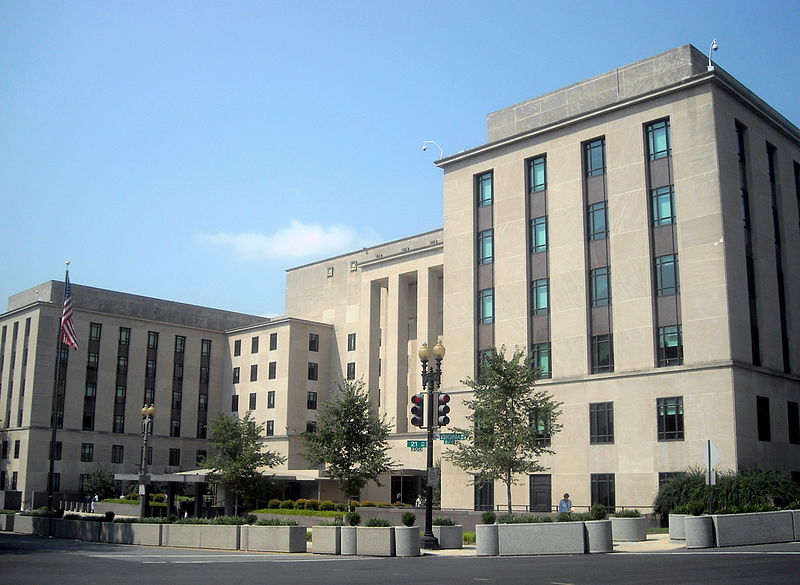The United States sends mixed messages to India.On the one hand, Washington highlighted the importance of India’s rise and leadership in its Indo-Pacific Strategy, designated India a Major Defense Partner, and renamed PACOM as INDOPACOM in recognition of India’s important role in the region.
On the other hand, in spite of statements about the importance of people-to-people relations, it currently takes years for someone in Delhi to get an appointment for a US visa, India’s efforts to feed and provide power for its people are described as being against the greater good and, well, Pakistan.
So, what’s going on?Well, as with any country, there is more than one “United States”. So, for example, while the Department of Defense “gets” India, others seem to have different priorities. So, who is in the driver’s seat when it comes to shaping US foreign policy?

WHICH UNITED STATES?
Some, especially those in the Department of State, will say that say State alone and exclusively is responsible for foreign policy.
That is not legally accurate. In some areas, such as declaring war, Congress plays a role. And, within the executive branch, foreign policy is the responsibility of the President.
Under the President there are a range of departments and agencies, including State. When more than one works together, that is called “interagency”, and there is a lot of interagency involved in foreign affairs. There is also the National Security Council that convenes, coordinates and advises.
But, as with any large organisation, there are laws, rules and regulations, and then there is the bareknuckle brutality of bureaucratic warfare. And State is very good at that.
State tends to see the world and shape foreign policy through the prism of “departmental equities” that can be more narrow and bureaucratic than the broader US national interest, including but certainly not limited to relations with India.
On such a deep, wide-ranging and important file as India, there should be broad interagency mechanisms not controlled by State or any single department’s interagency process or authority.
Not only is that what the National Security Council does when the White House remembers why it was created, the Department of Defense often has better relations with its counterparts in India than State. Defense, which has a similar understand of strategic threats as India, has good on the ground understanding of India’s operating environment.
Yet, a State desk officer might be making decisions that can negate years of relationship building by other departments.
This is a structural problem.State may be engaging with India, saying it is doing so on behalf of the US government, but at times the actions seem designed to control the processes to preserve “State equities” rather than US equities.
THE AWESOME POWER OF THE C-175
Similarly, State can manipulate the interagency process by, for example, asserting its own internal departmental directives, including the Foreign Affairs Manual and C-175 process, that entitle State to determine what other departments and agencies will be consulted developing US foreign policy.By deciding who is in the room, and what they can contribute, you can have a lot of control over the outcome.
The result is often that “equities” of other departments are not given equal value in defining not just treaty-making procedures but the US national interest.
Effectively, State can make US policies through an interagency process that, often, it has the ability to control and manipulate. By the time accountability and authorizing mechanisms superior to State—including the National Security Council (NSC) and Office of Management and Budget (OMB)—get involved, the policy can already be in place or difficult to alter substantially.
The result is State desk officers (and legal
THE STATE OF STATE
Unfortunately, when it comes to India, State seems to be one of the departments least interested in improving relations. As a result, the first step in improving relations with India would be to ensure that engagement strategy is truly a US strategy and not just a State strategy.
That would mean reforming State’s relationship to the rest of the executive branch—having it become more consistently, reliably, even-handed and less selectively integrated in the decision-making disciplines of the executive branch and even in Congressional oversight.
The Foreign Affairs Manual and the C-175 process are valued and venerable sources of internal departmental authority and interagency coordination of the treaty-making and diplomatic relations process.
But where national interest and national security stakes transcend any single department’s equities, then NSC, OMB and other components of the Office of the President have all-of-government responsibility and authority for interagency coordination in which State may or may not be the first among equals.
State should be given no undue or presumptive deference other than on the merits, and certainly not because its internal departmental directives—which it may have written for itself in the first place—say so.If this is done, a whole new set of tools, from a much wide range of departments, can be added to the engagement toolbox, allowing for the building of a solid, multifaceted foundation for future US-India relations.
Of course, this is easier said than done. But perhaps it is useful to know that it isn’t the “United States” that doesn’t want good relations with India. It might mostly be a very small number of people in one section of a large government who just happen to be very, very good at bureaucratic warfare.
A different version of this article appeared in American Foreign Policy Council’s Defense Dossier.
Cleo Paskal is The Sunday Guardian Special Correspondent as well as Non-Resident Senior Fellow for the Indo-Pacific at the Foundation for the Defense of Democracies.

